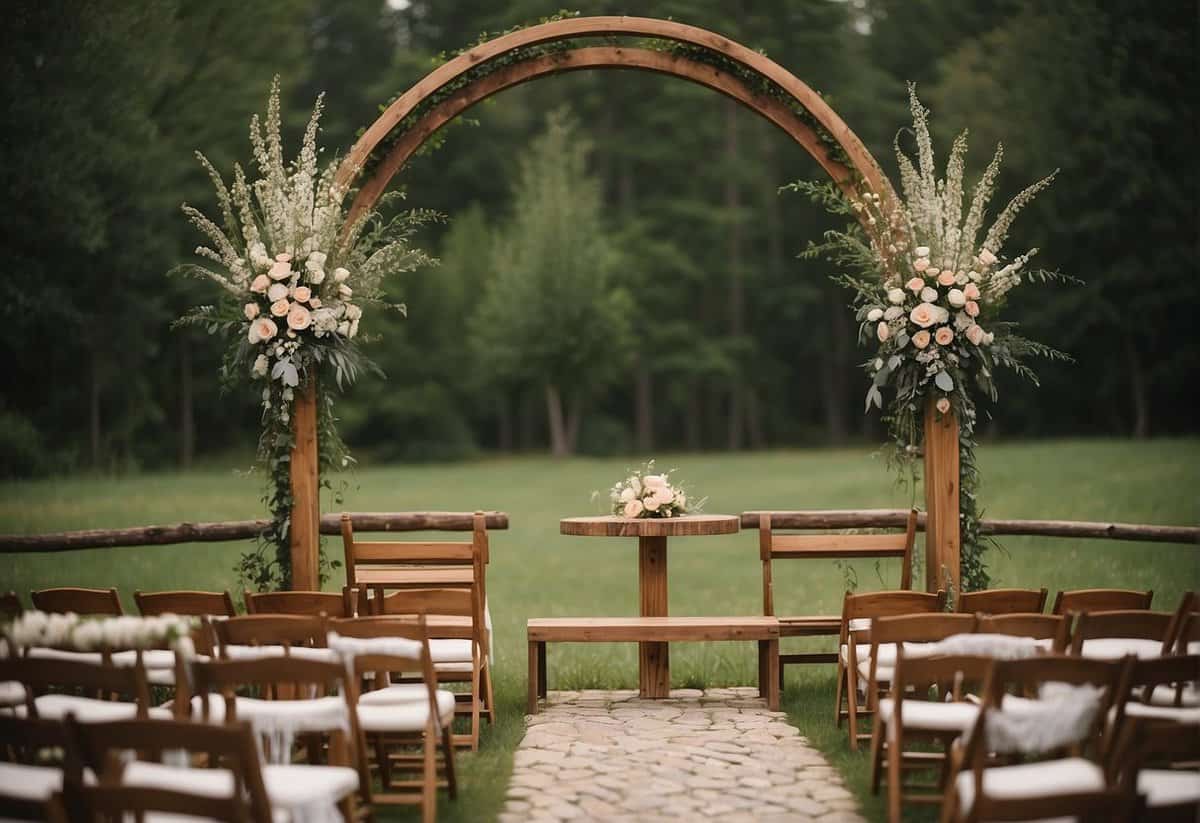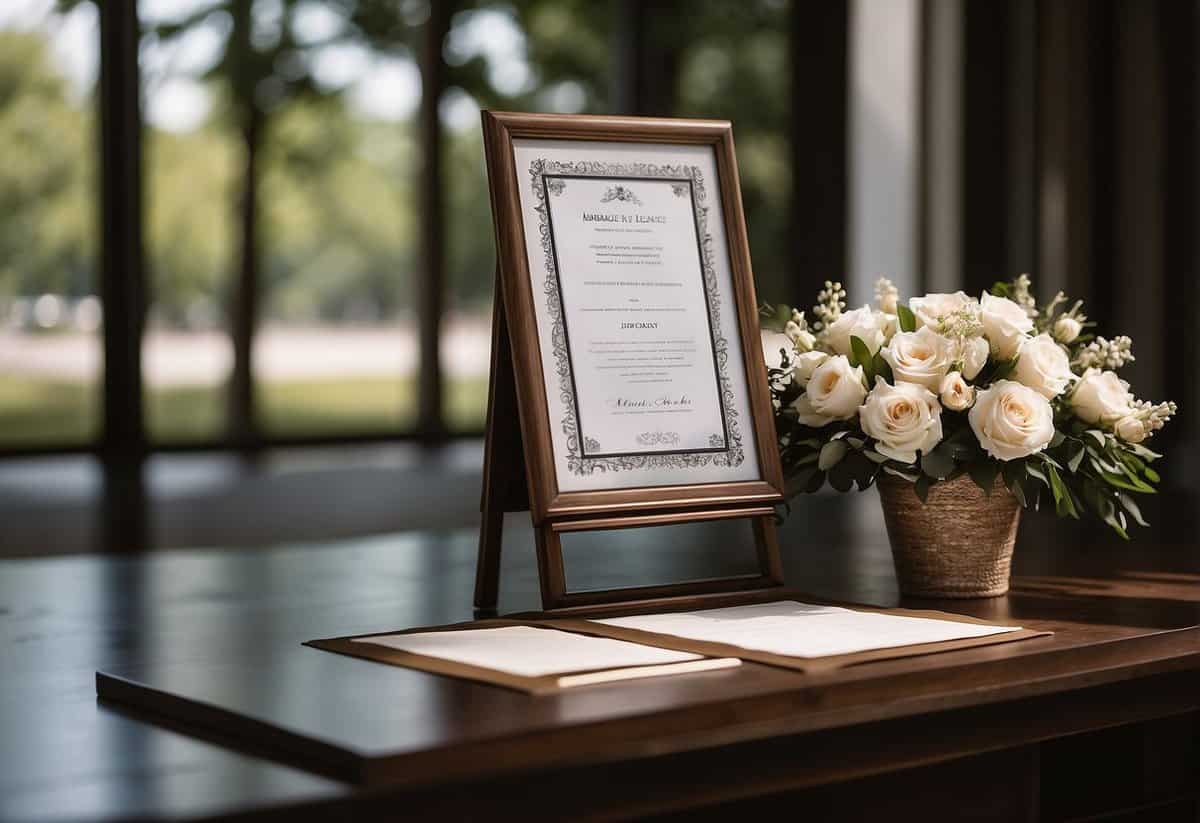Can You Get Married Just the Two of You? The Essentials of an Intimate Wedding
Embarking on a journey together often starts with the special commitment of marriage. Couples might wonder if it’s possible to get married with only the two of them present. The answer is yes, it’s entirely possible to forgo a traditional wedding and instead opt for a more intimate ceremony. This approach to exchanging vows puts the focus squarely on the couple’s bond and their shared moment. It offers a personal and often more straightforward alternative to larger weddings.

Marrying just as a pair means considering various legal stipulations which differ from place to place. It’s essential to understand what’s required—from consent to age and residency requirements. When the legalities are in order, planning can be as simple or elaborate as you wish. Whether it’s an elopement at a city hall or a quiet ceremony in a picturesque location, your day can reflect your personal tastes and the unique story of your relationship.
After saying “I do,” there are several steps to solidify your marital status, such as obtaining a marriage certificate and addressing name changes or financial matters. Couples should also be prepared to answer questions from those curious about the decision to marry privately. Nurturing your partnership with an intimate ceremony can be a meaningful and fulfilling experience, marking a significant beginning with simplicity and love.
Key Takeaways
- Couples can legally marry with just the two of them.
- Be sure to comply with all legal requirements for marriage in your location.
- After the ceremony, take the necessary legal and financial steps as a married couple.
Legal Considerations and Requirements

When you’re planning to get married, it’s important to know that marriage is not just a ceremonial union but a legal contract that requires meeting specific legal criteria. Let’s walk through the steps and make sure all your ducks are in a row before the big day.
Understanding Marriage Laws
First things first, you’ll need to understand your state’s requirements for a legal marriage. Every state has unique laws regarding marital status, age requirement, and consent. For instance, the typical age to marry without parental consent is 18, but some states allow marriage at a younger age with parental or judge approval. Civil unions and domestic partnerships are alternatives to marriage offered in some states and have different requirements.
Also, if you’ve been married previously, legal documents proving annulment, divorce decree, or the death of a spouse may be necessary. And remember, marrying more than one person (bigamy) is illegal in all states.
Obtaining a Marriage License
You can’t skip this part: a marriage license is a must-have. You’ll apply for one at a local county clerk or court clerk‘s office. Along with your application, there is often a license fee and a waiting period before the license is valid, which can range from a few hours to a few days. Some states even require blood tests. The license is typically valid for a limited time, so time your license application carefully.
Required Documents and Identification
Gathering the necessary documents is crucial. You’ll usually need:
- A birth certificate to prove your age
- A driver’s license, passport, or other photo ID for identification
- Your Social Security number if you have one
- If applicable, certified copies of divorce decree or death certificate from previous marriage
In most cases, you’ll also need to provide information about your marital status, and some states may require an affidavit stating there are no legal impediments to your marriage. After your ceremony, make sure to get a certified copy of your marriage certificate for your records and for processes like changing your name on your driver’s license and passport, or updating your social security card.
Don’t let this paperwork intimidate you, it’s all just part of the journey to officially starting your life together!
Planning Your Intimate Wedding

Embarking on the journey of marriage can be just as meaningful and beautiful with just the two of you. An intimate wedding strips away the hustle and focuses on the sincere commitment between partners. In planning yours, consider a few essential details to make your day truly special.
Selecting the Location
Choosing the ideal location for your intimate wedding can set the tone for your special day. Whether you dream of saying your vows in a Las Vegas chapel, amongst the serene landscapes of Alaska, or on the sun-kissed beaches of California, finding a spot that resonates with your personal story is key. Remember, you can always opt for a meaningful place closer to home—a backyard or local park can be just as enchanting.
The Role of Witnesses and Officiants
In most states, including Arizona, Arkansas, Alabama, and Colorado, you’ll need at least one witness to sign the marriage certificate. However, in some states like Connecticut, you can marry without one. The officiant‘s role is to solemnize your marriage. This could be a religious figure, a judge, or someone ordained online. Before your wedding date, check with your local county clerk or recorder’s office for specific requirements, especially if a name change is in your plans post-ceremony.
Personalizing the Ceremony
An intimate wedding with no guests opens up endless possibilities for personalizing the ceremony. You can custom-tailor every aspect, from writing heartfelt vows to selecting music that tells your story. Since there’s no need to book a large wedding venue, you have the freedom to splurge on elements that matter most to you, like a special attire or a unique symbol of your love.
After the Wedding: Legal and Financial Steps

After exchanging your vows and celebrating your union, a significant aspect of post-wedding life involves taking legal and financial steps to solidify your new beginning. From changing your name to understanding how your finances will be affected by marriage, these steps are crucial for setting a strong foundation for your future together.
Changing Your Name and Updating Documents
If you’ve decided to change your name after marriage, your first step should be obtaining your marriage certificate, as it’s needed to prove the legal change. Next, update your name with the Social Security Administration, which is necessary before you modify other forms of identification. Remember to update your Social Security card, as this impacts your FICA and SSI contributions.
Here’s what to update:
- Social Security card
- Driver’s license
- Passport
- Bank accounts and credit cards
- Employment records
- Insurance policies
Each document may require different forms of proof, and some might involve a fee. Make sure you also update your signature everywhere it’s required to avoid future complications.
Understanding Marital Finances
Marriage introduces changes in how you file your taxes and can affect your eligibility for certain tax credits. As a married couple, you may choose to file jointly with the IRS, potentially leading to a lower tax rate. However, this might not always be beneficial, depending on your respective incomes, so consider consulting a tax professional to understand how filing jointly impacts you in light of inflation or a low-income threshold.
Consider your joint approach to savings and investment. Discuss how to manage individual and joint accounts, how much each of you can contribute to savings, and how to handle property acquired before and after the marriage. Being transparent about your financial situation fosters a stronger relationship and helps mitigate the financial stress that can lead to divorce.
Lastly, review and update insurance policies such as health, life, and disability coverage. Ensure your spouse is entitled to benefits and that beneficiary information reflects your new circumstances. The transition from single to married life is an optimal time to establish a financial plan that accommodates mutual goals and provides security for both of you.
Frequently Asked Questions

If you’re considering tying the knot just the two of you, it’s important to familiarize yourself with certain legal requirements and options available for your marriage. This FAQ section touches on key aspects of self-officiating, the legal recognition of elopements, and other nuances of small, intimate ceremonies.
Are there any specific states in the US that allow self-officiation of a marriage?
Yes, certain states like Colorado, Pennsylvania, Wisconsin, and parts of Nevada permit self-officiation where the couple can marry without the presence of a third-party officiant.
When eloping, is the marriage legally recognized?
Eloping leads to a marriage that is legally recognized, provided all legal requirements for marriage per your state’s law, such as obtaining a marriage license and age consent, are met.
What are the requirements for witnesses when getting married at the courthouse?
Most states require at least one or two witnesses for a marriage ceremony at a courthouse. The exact number can vary by state, and the witnesses must be adults and understand what they are observing.
How can a couple elope discreetly?
To elope discreetly, choose a location that’s private and secure a marriage license without announcing your intent widely. A courthouse wedding or a simple ceremony at a non-public venue can maintain the confidentiality of your nuptials.
What’s the distinction between an elopement and a traditional wedding ceremony?
An elopement typically involves just the couple or a very small group and is often done with less formal planning and fanfare, while a traditional wedding ceremony usually includes a larger gathering of guests, a reception, and more elaborate preparations.
What term is used to describe a marriage ceremony attended only by the couple?
A marriage ceremony attended only by the couple is often referred to as an elopement or a “self-uniting” marriage, depending on the context and location of the ceremony.

